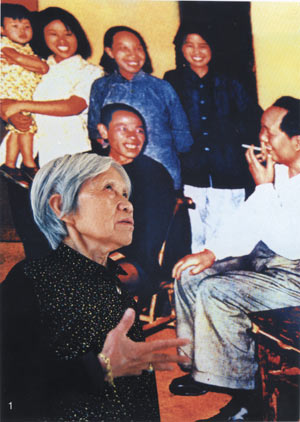Tang Ruiren, 83, thought she would remain an ordinary farmer forever.
But a leap of faith some 30 years ago, changed her life. With only 1.70 yuan (27 cents), she started a small stall selling porridge to tourists who started pouring into Shaoshan village, in Hunan province, to visit former chairman Mao Zedong's home.
|
 Tang Ruiren recalls former chairman Mao Zedong's visit to her family in 1959 before a picture of the meeting. Provided to China Daily |
"I earned more than 3 yuan on the first day," says Tang, who used to live opposite Mao's former residence. "That's four times what an ordinary farmer earns a day."
Today, Tang owns more than 300 restaurants throughout China and abroad, with her signature dish - pork braised in brown sauce - which is also Mao's favorite food.
Born in a poor family, she and her brother begged for a living until she got married at 14 and became a farmer. Her husband was always away from home, serving in the army. Tang says she had to support the family on her own, which made her courageous.
When she first started her porridge stall, she got flak from her neighbors. They opined that Chairman Mao's fellow villagers should not become entrepreneurs, which is considered capitalistic.
"I regained my confidence with the encouragement of some guests who said that it's nothing shameful to earn money with one's own hands," shares Tang, who is now bedridden because of fractured bones on her body and legs.
Three years after she started her business, Tang's family saved more than 10,000 yuan - a considerable amount then. From a small porridge stall, Tang expanded her venture into a home restaurant, taking advantage of the location of her home.
She hung a huge picture of her with Mao in the middle of her restaurant, which attracted many curious diners including foreigners and celebrities. Through the years, Tang has even picked up some simple phrases in different languages to explain the significance of the photograph and her dishes to her patrons.
All her restaurants now have portraits and bronze statues of Mao. One particular photo always draws attention - a photo of Mao with her and her son.
"This picture is very precious to my whole family," Tang says, recalling her excitement when the late leader paid a visit to her family and chatted with them when he returned home in 1959.
"I was a farmer who never went to school. I'm grateful to Chairman Mao for my comfortable life," the gray-haired woman says.
For decades, Tang has been paying it forward. She has sponsored a few hundred students from poor families and adopted dozens of orphans.
Hu Aihui, 46, who used to be a farmer and now works in Tang's restaurant, is grateful to Tang for supporting her son through university and for offering her a job.
"The work is simple and I've a better income now," Hu says. "Granny Tang is like our own mother and all the employees feel at home here."
In recent years, Tang established two foundations to help the elderly and the disabled respectively.
To those around her, Tang is a cheerful and open-minded woman. She was always quite fashionable and loves wearing colorful clothes and high-heels. Tang used to greet her foreign guests with simple English words like "please come in" and "good bye", until she was bedridden.
"Mother requires all of us to operate the business honestly, and she regards our restaurants as windows to Shaoshan," says Tang's daughter Mao Taozhi, who is helping to manage the company.
"She hardly complains and is always strong and optimistic, even though she endured a lot of hardships," says Mao Taozhi. Tang's son died in a car accident a decade ago.
When Tang was diagnosed with cancer a few years ago, it did not stop her from working.
"My way to drive away sadness is to find something to do," says Tang, who relocated her original restaurant to a new location, in respond to town planning. "I don't agree with those who say I should retire and enjoy life now that I'm more than 80 years old. I always find joy in doing things."
Feng Zhiwei contributed to the story.
Contact the writer at [email protected]
